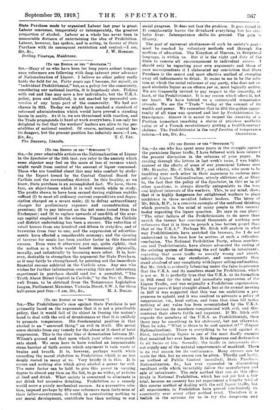[To THE EDITOR OF THE " SPECTATOR."] Sut,—The Prohibitionist's case
against State Purchase is not primarily based on the arguments that it is not a practicable policy, that it would fail of its object in freeing the nation's hand to deal with the evil of drunkenness or that it is unlikely to promote temperance. His fundamental position is that alcohol is an " accursed thing," an evil in itself. His moral sense shrinks from any remedy for the abuse of it short of total suppression. This is the clear line of demarcation between Mr. Wilson's ground and that upon which your other correspond- ents stand. We seem here to have reached an impenetrable stone barrier of faith across which argument is vain waste of brains and breath. It is, however, perhaps worth while recording the moral objbction to Prohibition which is no less deeply rooted in many of us. Very briefly it is this. It is excess and nothing else which gives alcohol a power for evil. The same factor can be held to give this power in varying degree to almost any item on the list, to go no wider, of articles of food and drink. What society is concerned to eliminate is not drink but excessive drinking. Prohibition as a remedy would score a purely mechanical success. As a preventive solu- tion, imposed perhaps by fifty-one reformers upon forty-nine of their fellow-countrymen, it would, in contributing nothing to our moral development, contribute less than nothing to our
social progress. It does not face the problem. It goes round it. It complacently leaves the drunkard everything but his cirr- hotic liver. Intemperance shifts its ground. The gain is illusory.
The goal of universal abstinence—if such be society's goal— must be reached by voluntary methods and through the medium of education. The Kingdom of Heaven, in Scriptural language, is within us. But it is the right and duty of the State to remove all encouragement to individual excess. I should only be repeating your own arguments and those of your correspondents if I elaborated my conviction that State Purchase is the sanest and most effective method of sweeping away all inducements to drink. It seems to me to be the solu- tion at which the social reformer of any party, who does not re- gard alcoholic liquor as an offence per se, must logically arrive. We are frequently invited to pay respect to the sincerity, at least, of the Prohibitionist. It is my reason which offers it, not my heart. We have behind us a century-old temperance crusade. We see the " Trade " to-day at the summit of its wealth and power. We remember that in 1915 the golden oppor- tunity of all time was spurned and lost by Prohibitionist in- transigence. Almost it is easier to respect the sincerity of a Puritan iconoclast smashing a statue of priceless aeethetie value or of a French revolutionary gutting a twelfth-century château. The Prohibitionist is the verf Jacobin of temperance






































 Previous page
Previous page